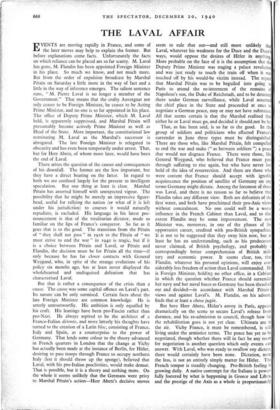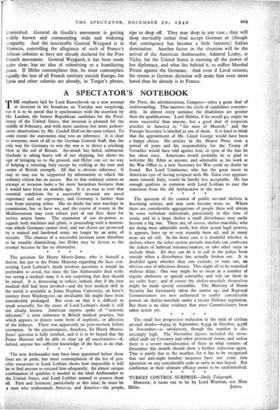THE LAVAL AFFAIR
EVENTS are moving rapidly in France, and some of the later moves may help to explain the former. But before explanations come facts. Unfortunately the facts on which reliance can be placed are so far scanty. M. Laval has gone, M. Flandin has been appointed Foreign Minister in his place. So much we know, and not much more. But from the order of expulsion broadcast by Marshal Petain on Saturday a little more in the way of fact and a little in the way of inference emerges. The salient sentence runs, " M. Pierre Laval is no longer a member of the Government." That means that the crafty Auvergnat not only ceases to be Foreign Minister, he ceases to be Acting Prime Minister, and no one is so far appointed in his place. The office of Deputy Prime Minister, which M. Laval held, is apparently suppressed, and Marshal Main will presumably become actively Prime Minister as well as Head of the State. More important, the constitutional law nominating M. Laval as the Marshal's successor is abrogated. The late Foreign Minister is relegated to obscurity and has even been temporarily under arrest. That, but for Herr Abetz, of whom more later, would have been the end of Laval.
There arises the question of the causes and consequences of his downfall. The former are the less important, but they have a direct bearing on the latter. In regard to both we are confined largely for the present to intelligent speculation. But one thing at least is clear. Marshal Main has asserted himself with unexpected vigour. The possibility that he might be merely an impressive figure- head, useful for rallying the nation (or what of it is left under his jurisdiction) to courses it would naturally repudiate, is excluded. His language in his latest pro- nouncement is that of the totalitarian dictator, made so familiar on the lips of France's conqueror. So far as it goes that is to the good. The transition from the Petain of " they shall not pass " in 1916 to the Petain of " we must strive to end the war " in 1940 is tragic, but if it is a choice between Petain and Laval, or Main and Flandin, the decision must be for Main all the time—if only because he has far closer contacts with General Weygand, who, in spite of the strange evolutions of his policy six months ago, has at least never displayed the wholehearted and undisguised defeatism that has characterised Laval.
But that is rather a consequence of the crisis than a cause. The cause was some capital offence on Laval's part. Its nature can be only surmised. Certain facts about the late Foreign Minister are common knowledge. He is utterly untrustworthy. His ambition is only equalled by his craft. His leanings have been pro-Fascist rather than pro-Nazi. He always aspired to be the architect of a Franco-Italian détente, and more latterly his thoughts have turned to the creation of a Latin bloc, consisting of France, Italy and Spain, as a counterpoise to the power of Germany. That lends some colour to the theory advanced in French quarters in London that the change at Vichy has actually been made at the instance of Berlin, for Hitler, desiring to pass troops through France to occupy northern Italy (lest it should throw up the sponge), believed that Laval, with his pro-Italian proclivities, would make demur. That is possible, but it is a theory and nothing more. On the whole it seems unlikely that the Germans were privy to Marshal Petain's action—Herr Abetz's decisive moves seem to rule that out—and still more unlikely tha Laval, whatever his weakness for the Duce and the Duce's ways, would oppose the desires of Hitler in anything More probable on the face of it is the assumption that th. Deputy Prime Minister was staging a palace revolution and was just ready to touch the train off when it w. touched off by his would-be victim instead. The repo that Marshal Petain was to be beguiled into going t Paris to attend the re-interment of the remains o Napoleon's son, the Duke of Reichstadt, and to be detained there under German surveillance, while Laval assumed the chief place in the State and proceeded at once t negotiate a German peace, may or may not have substance. All that seems certain is that the Marshal realised tha either he or Laval must go, and decided it should..not be he.
That, as has been said, is so far to the good. In the group of soldiers and politicians who effected France's surrender in June three types must be distinguished. There are those who, like Marshal Petain, felt compelled to end the war and make (" as between soldiers ") a peace that would not disgrace France. There were those, like General Weygand, who believed that France must pass through suffering to rise again, but who have never lost hold of the idea of resurrection. And there are those who were content that France should accept with ignoble acquiescence the position of satellite of Germany on anv terms Germany might dictate. Among the foremost of these was Laval, and there is no reason so far to believe that Flandin takes any different view. Both are defeatists of the first water, and both have proclaimed their pro-Axis views without concealment. No one could well be a worse influence in the French Cabinet than Laval, and to that extent Flandin may be some improvement. The new Minister was, moreover, in one of the phases of his opportunist career, credited with pro-British sympathies. It is not to be suggested that they sway him now, but at least he has an understanding, such as his predecessor never claimed, of British psychology, and probably a correspondingly better comprehension of British mili- tary and economic power. It seems clear, too, that Flandin, whatever his personal opinions, will enjoy con- siderably less freedom of action than Laval commanded. He is Foreign Minister, holding no other office, in a Cabinet in which the question whether France should surrender her navy and her naval bases to Germany has been thrashed out and decided—in accordance with Marshal Petain's views and against Laval's. M. Flandin, on his advent. finds that at least a chose jugee.
But here Herr Abetz, Hitler's envoy in Paris, appears dramatically on the scene to secure Laval's release from durance, and his re-admission to council, though how far the rehabilitation goes is not yet clear. Ultimata are in the air. Vichy France, it must be remembered, is still living under the armistice terms. The peace has yet to be negotiated, though whether there will in fact be any room for negotiation is another question which only events can answer. With Laval, who was ready to swallow any dictate. there would certainly have been none. Dictation, none the less, is not an entirely simple matter for Hitler. The French temper is steadily changing. Pro-British feeling is growing daily. A native contempt for the Italians is power- fully fostered by what is happening in Greece and Libya, and the prestige of the Axis as a whole is proportionately diminished. General de Gaulle's movement is getting widely known and commanding wide and widening sympathy. And the inscrutable General Weygand is in Morocco, controlling the allegiance of such of France's African colonies as have not already declared for the Free French movement. General Weygand, it has been made quite clear, has no idea of submitting to a humiliating peace. If Hitler contemplates that, he must contemplate equally the loss of all French territory outside Europe, for Syria and other colonies are already, in Turgot's phrase, ripe to drop off. They may drop in any case ; they will drop inevitably rather than accept German or (though that contingency has become a little fantastic) Italian domination. Another factor in the situation will be the arrival of the American Ambassador, Admiral Leahy, at Vichy, for the United States is exerting all the power of her diplomacy, and what lies behind it, to stiffen Marshal Petain against the Germans. And even if Laval returns, his return at German dictation will make him even more hated than he already is in France.



























 Previous page
Previous page